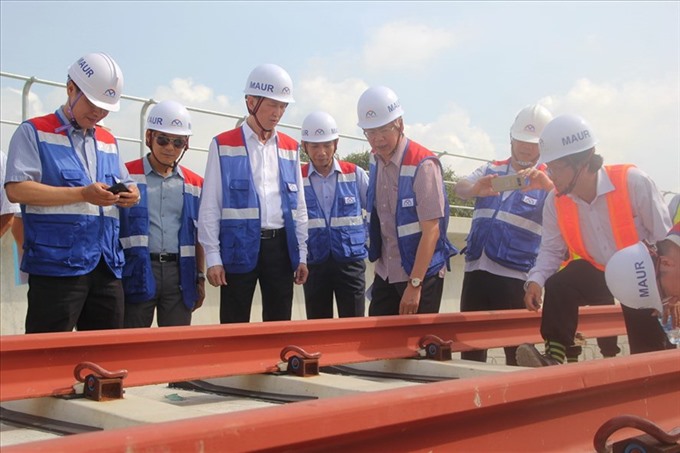 Society
Society

" />A delegation from the National Assembly’s economic committee on Jun 25 inspected parts of HCM City’s Metro Line No. 1 (Bến Thành-Suối Tiên) construction project to examine why costs have increased in recent years and find ways to seek more capital sources.
 |
| Nguyễn Đức Kiên (third from right) inspects the installation of an underground railway at Thủ Đức metro station. Photo laodong.vn |
HCM CITY — A delegation from the National Assembly’s economic committee on Jun 25 inspected parts of HCM City’s Metro Line No. 1 (Bến Thành-Suối Tiên) construction project to examine why costs have increased in recent years and find ways to seek more capital sources.
The capital needed to complete the line has risen from VNĐ17.4 trillion (US$759.73 million) to VNĐ47.3 trillion ($2.06 billion), according to the city government. But the NA has yet to approve the amount.
The NA delegration, led by Nguyễn Đức Kiên, vice chairman of the economic committee, and Trần Vĩnh Tuyến, vice chairman of the city People’s Committee, visited Long Bình Depot and Thủ Đức, Ba Son and Bến Thành stations.
Kiên said the inspection examined changes in the project’s design, structure, length of route, and construction of terminals, all of which have led to an increase in capital.
"The city administration, the central Government and the NA need to work together to ensure sufficient capital sources according to loan agreements signed by the central Government," he said.
The date of completion for the line has been rescheduled several times, with the most recent completion date expected by 2020.
Official Development Assistance (ODA) funding last year and in the 2016-20 period has not met demand, according to the city government.
For example, ODA was VNĐ2,119 billion last year, while demand was VNĐ5,422 billion. In the 2016-2020 period, ODA was only VNĐ7,500 billion, but demand for capital was VNĐ20,930 billion.
To ensure the progress, the city government has advanced the budget three times to pay for construction contractors, for a total of VNĐ2.3 trillion.
However, this was only a temporary solution, Trần Vĩnh Tuyến, vice chairman of the city People’s Committee, said.
According to the HCM City Management Authority for Urban Railways (MAUR), as of early June, the project’s disbursement value, excluding compensation and site clearance, had reached VNĐ15,069 trillion, equivalent to 31.8 per cent of the approved total investment.
As of early June, more than half of the work, which consists of four bidding packages, has been completed on Metro No 1 line, including an elevated section and depot, according to MAUR.
The project had followed design and technical standards as well as the quality management plan stated in the tender packages, Kiên said.
Tuyến said that project preparation would take about two to three years, so it would be necessary to adjust the design and total investment to suit the latest status.
In addition, metro projects with large investment capital (billions of US dollars) need approval from the Prime Minister.
However, the approval process must go through many levels, which could lead to delays in deployment, he said.
According to the 2005 Law on Railways and the amended law of 2017, cities and provinces directly under management of the Central Government can make decisions on investment, as long as the decisions conform to the State Budget Law and the Law on Public Investment.
HCM City authorities have previously asked the NA to increase investment for the line, which connects Bến Thành Market in District 1 and Suối Tiên Theme Park in District 9.
The metro line was approved by the city in April 2007 with an investment of VNĐ17.4 trillion. At that time, approval by the NA was not needed
After investment costs were re-assessed by consulting agencies, costs rose to more than VNĐ47.3 trillion.
The city administration attributed the rising costs to price changes for construction materials, an increase in the minimum wage, and the depreciation of the Vietnamese đồng and Japanese yen, among others.
In addition, capital needed for Metro Line No 2, which connects Bến Thành Market in District 1 with Tham Lương in District 12, has also risen, from VNĐ26 trillion to nearly VNĐ48 trillion. The completion deadline for the line has been extended from 2020 to 2026. — VNS




